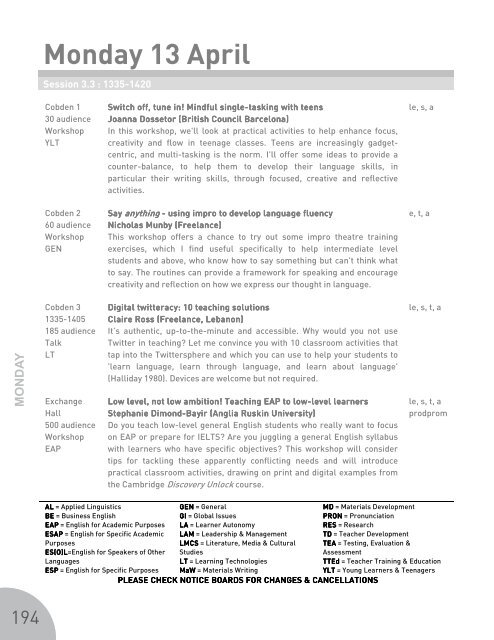Create successful ePaper yourself
Turn your PDF publications into a flip-book with our unique Google optimized e-Paper software.
Monday 13 April<br />
Session 3.3 : 1335-1420<br />
Cobden 1<br />
30 audience<br />
Workshop<br />
YLT<br />
Switch off, tune in! Mindful single-tasking with teens<br />
Joanna Dossetor (British Council Barcelona)<br />
In this workshop, we'll look at practical activities to help enhance focus,<br />
creativity and flow in teenage classes. Teens are increasingly gadgetcentric,<br />
and multi-tasking is the norm. I'll offer some ideas to provide a<br />
counter-balance, to help them to develop their language skills, in<br />
particular their writing skills, through focused, creative and reflective<br />
activities.<br />
le, s, a<br />
Cobden 2<br />
60 audience<br />
Workshop<br />
GEN<br />
Say anything - using impro to develop language fluency<br />
Nicholas Munby (Freelance<br />
Freelance)<br />
This workshop offers a chance to try out some impro theatre training<br />
exercises, which I find useful specifically to help intermediate level<br />
students and above, who know how to say something but can't think what<br />
to say. The routines can provide a framework for speaking and encourage<br />
creativity and reflection on how we express our thought in language.<br />
e, t, a<br />
MONDAY<br />
Cobden 3<br />
1335-1405<br />
185 audience<br />
Talk<br />
LT<br />
Exchange<br />
Hall<br />
500 audience<br />
Workshop<br />
EAP<br />
Digital twitteracy: 10 teaching solutions<br />
Claire Ross (Freelance, Lebanon)<br />
It’s authentic, up-to-the-minute and accessible. Why would you not use<br />
Twitter in teaching? Let me convince you with 10 classroom activities that<br />
tap into the Twittersphere and which you can use to help your students to<br />
'learn language, learn through language, and learn about language'<br />
(Halliday 1980). Devices are welcome but not required.<br />
Low level, not low ambition! Teaching EAP to low-level level learners<br />
Stephanie Dimond-Bayir<br />
(Anglia Ruskin University)<br />
Do you teach low-level general English students who really want to focus<br />
on EAP or prepare for IELTS? Are you juggling a general English syllabus<br />
with learners who have specific objectives? This workshop will consider<br />
tips for tackling these apparently conflicting needs and will introduce<br />
practical classroom activities, drawing on print and digital examples from<br />
the Cambridge Discovery Unlock course.<br />
le, s, t, a<br />
le, s, t, a<br />
prodprom<br />
AL = Applied Linguistics<br />
BE = Business English<br />
EAP = English for Academic Purposes<br />
ESAP = English for Specific Academic<br />
Purposes<br />
ES(O)L=English for Speakers of Other<br />
Languages<br />
ESP = English for Specific Purposes<br />
GEN = General<br />
GI = Global Issues<br />
LA = Learner Autonomy<br />
LAM = Leadership & Management<br />
LMCS = Literature, Media & Cultural<br />
Studies<br />
LT = Learning Technologies<br />
MaW = Materials Writing<br />
MD = Materials Development<br />
PRON = Pronunciation<br />
RES = Research<br />
TD = Teacher Development<br />
TEA = Testing, Evaluation &<br />
Assessment<br />
TTEd = Teacher Training & Education<br />
YLT = Young Learners & Teenagers<br />
PLEASE CHECK NOTICE BOARDS FOR CHANGES & CANCELLATIONS<br />
194


